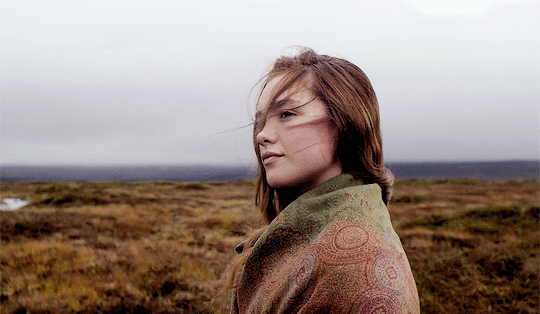 Lady Macbeth
Lady Macbeth, 2016
Katherine (Florence Pugh) is a young women married to a much older man named Alexander (Paul Hilton), who seems to only enjoy her companionship to the degree that he can humiliate and control her. The couple lives with Alexander's father, Boris (Christopher Fairbank), and Katherine faces constant reproaches at the hands of both men. But when Alexander and Boris are both called away, Katherine begins an affair with a worker on the property called Sebastian (Cosmo Jarvis). Enthralled with both her sexual liberation and her role as mistress of the house, Katherine begins to take steps to make her power more permanent.
A slightly muted period piece with themes and layers about control and power, lush costuming, and great performances? Just inject it directly into my veins, already!
Yes, this is the kind of film I really love. True to her namesake in the title, Katherine's defining characteristic is her cold-bloodedness, but her story is given a bit more nuance because of the nuances of power and the precariousness of her position due to her social class and gender. Ultimately, Katherine is able to overcome these barriers to power, but at great, great cost to others.
The initial feeling you get toward Katherine is one of sympathy. On their wedding night her new husband orders her to stay confined to the house. When she objects that she likes walking outdoors he orders her to undress. When she is nude, he sizes her up and then makes a point of going to bed without her. Her life is a series of humiliations and pain punctuating a dull everyday existence of sitting alone in the home's living room, her waist painfully cinched for an audience of, well, no one.
But a real turning point, and the moment the film lets us know quite firmly that Katherine's is not the worst lot, is when Katherine finds the house's maidservant, Anna (Naomi Ackie) being sexually assaulted and humiliated by some of the male laborers, led by Sebastian. Katherine's takeaway from this horrifying scene is not sympathy for Anna, but rather sexual intrigue as she sizes up Sebastian.
Most of the horror of what Katherine does isn't centered on her victims (though obviously there is one really big exception to this!), but for me the way that she so easily shunts the blame onto those with less power, usually Anna. When Katherine drinks all of her father-in-law's favorite wine, Anna must report to him that the wine has run out. Unable to sell out Katherine, Anna must settle for telling Boris that she doesn't know where the wine has gone. Angry, Boris forces Anna to crawl on the ground like a dog. Katherine looks on with barely contained mirth. While we the audience might be okay with Katherine seeking revenge on the men who have made her life miserable, you can't help but be appalled by the impact that she has on Anna's wellbeing.
Her relationship with Sebastian likewise goes on a crazy arc of shifting power. In the beginning, Sebastian is very forward with her. He picks her up in the out-building and she must push him off of her. Later he boldly breaks into her bedroom. But whereas Sebastian walks around with quite a bit of swagger, he is totally unprepared for the shamelessness with which Katherine will pursue her own desires. Katherine is chided several times in the film for being "shameless", and she actually discovers that her lack of shame (or guilt, or remorse) is her secret, sociopathic superpower.
If I had one criticism of the film, it would be that Katherine's endgame didn't seem that clear to me. Sure, we know that she is ruthless. An early warning comes when she tells Sebastian that she's rather he die before he not believe she loves him. Not that
she'd rather die than be apart, but that she'd rather see him dead. But where does this ruthlessness come from? We get hints that she is not from a wealthy family. She speaks very little of her mother. Toward the end I just started to wonder what she actually wanted. And, hey, maybe this was just a case of someone rolling down a hill with no brakes, having to merely dodge obstacles to stay alive. Even at the end I wasn't sure about how she felt regarding
WARNING: spoilers below
her pregnancy
her pregnancy
. There's something a bit unresolved about the character, but not in a productively ambiguous way. The same thing is true, in a lesser way, of the character of Alexander. Like, he won't even have sex with her for a formality? Maybe the implication is that
WARNING: spoilers below
he doesn't want another kid so that Teddy will stay his only heir?
he doesn't want another kid so that Teddy will stay his only heir?
.
Pugh's performance is really excellent. Ackie's performance is a really strong foil---the stronger Katherine becomes, the weaker Anna becomes, to the point of literal muteness. Jarvis brings confident boisterousness to Sebastian, something that starts to crumble as he realizes the lengths to which Katherine will go and the smothering effect of her love.
As I mentioned in the beginning of this review, I thought that the costumes were great. In particular the blue dress Katherine wears often. The lush colors of her clothing only call attention to the fact that she is almost completely socially isolated, dressed up only for a husband who won't sleep with her. I really liked the direction of the film and especially the editing (such as that hilarious smash cut from Katherine passionately making love to Sebastian to her sitting composed in the living room being served tea with the local pastor).
A strong film and noteworthy for Pugh's excellent lead performance.





